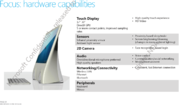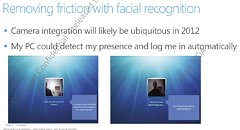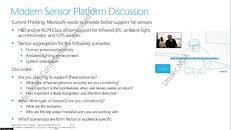Tuesday, June 29th 2010

Microsoft's Next Operating System Getting Drafted
Less than a year into the launch of Windows 7, and a few months in the making for its first service pack update, Microsoft has already taken large strides into outlining the key areas the company's next consumer operating system would focus on. Aimed to be released within the year 2012 time-frame (when Windows 7 will have become 3 years and 2 service packs old), Microsoft's next operating system is referred to as "Windows 8" (tada). The company had recently released to its industry partners a set of presentations, all covering different departments of the product's development, to outline the ideas in store for the developers. These confidential presentations were leaked to the public domain.
Among these presentations, some of the most interesting ones give us an insight on what interfacing with the PC will be like in a few years from now. To begin with, the average PC is poised to get a few mandatory updates to its hardware capabilities (just as how having a sound controller became mandatory for consumer PCs through the late 1990s). The PC will have a few sensors, cameras and accelerometers that will serve dual-purpose of user authentication and utility (use by software).Devices such as infrared proximity sensors, accelerometers, ambient-light and web-cameras will let PCs detect its user nearby, verify the user's identity by face-recognition, and load-up (or unlock) the user's account on the PC. Later, the user can just walk away from the PC, and it will standby, hibernate, shut-down, or simply lock the PC and turn-off the display, to save power.
The operating system will be even more cloud-oriented, letting users access their profiles from any other cloud-enabled PC or device. Another major development would be the adoption of a major software and content delivery platform along the lines of Apple Store or Valve Steam, where users will be able to buy content and proprietary software. For now the medium is referred to as the "Windows Store". The same service will also handle software updates and the product service. These and more will form the key changes that are relevant to the consumer in Microsoft's next OS. Once the brainstorming is complete, Redmond will sit down to develop, test, fix, and release the operating system.
Among these presentations, some of the most interesting ones give us an insight on what interfacing with the PC will be like in a few years from now. To begin with, the average PC is poised to get a few mandatory updates to its hardware capabilities (just as how having a sound controller became mandatory for consumer PCs through the late 1990s). The PC will have a few sensors, cameras and accelerometers that will serve dual-purpose of user authentication and utility (use by software).Devices such as infrared proximity sensors, accelerometers, ambient-light and web-cameras will let PCs detect its user nearby, verify the user's identity by face-recognition, and load-up (or unlock) the user's account on the PC. Later, the user can just walk away from the PC, and it will standby, hibernate, shut-down, or simply lock the PC and turn-off the display, to save power.
The operating system will be even more cloud-oriented, letting users access their profiles from any other cloud-enabled PC or device. Another major development would be the adoption of a major software and content delivery platform along the lines of Apple Store or Valve Steam, where users will be able to buy content and proprietary software. For now the medium is referred to as the "Windows Store". The same service will also handle software updates and the product service. These and more will form the key changes that are relevant to the consumer in Microsoft's next OS. Once the brainstorming is complete, Redmond will sit down to develop, test, fix, and release the operating system.



66 Comments on Microsoft's Next Operating System Getting Drafted
Anyway, even if I'm not sure I like the sound of all their ideas, it's good to see Microsoft getting right on this and looking to really innovate—while communicating enough in the industry to make sure the infrastructure to support these innovations will be there.
Most MSI Net-/Notebooks already support face-recognition for Win7 via 3rd party software from MSI :/
Before now it's been like going to the M$ take-away, buying oily chips and washing them down with greasy water, then paying for the equivalent of a 5-star meal; the experience has been bloated, featureless and overpriced.:shadedshu
Can't wait, I like new things.
Joke: Why does Apple fear MS's upcoming new Windows?
unless the general population of consumers can keep up with the software and then the hardware to go with it all this new wiz bang stuff dosnt mean alot .. look at all the ppl holding on for dear life to win xp 32bit os's and dx9. not saying they should upgrade, heck i think of my grandmother or my GF and the crap heaps they are running, but it dose what they need it to do so i can understand them not upgrading.
it just a big catch 22 to me. one step forward, stone wall, and two steps back ..
//END RANT
They already are using the phone GPS to detect location and serve up crap we don't ask for from that. Give me in home multiple audio multiple input/output terminals that act like a normal PC and we have a go. As it is right now I am trying to determine the best way to setup a 6 zone receiver system for music in my house and outside by the pool and later by a hot tub/deck. Why the F can't I buy/build a PC that has the ability to drive a display in a couple rooms, and multi-zone sound out of my media library? As it is now I have to fiddlefuck with my PC to get it to do what I want in small scale, and at this rate I will end up owning a main server with a few TB of storage, and about 6 PC's to run everything like my theater, gaming, music, wife's pc, living room, etc....
I would drop some cash on a OS that allows me to build a dual processor 16GB RAM 5970 watercooled beast with multiple sound devices that all work and drives 6 displays for use simultaneously.
Year 2012 is still a good while away, and it takes a while for a new OS to become mainstream.
There is nothing about DX12 in the article.
Hmmmm
I don't like the thought of that... ... or do I?
edit: windows 7 ABWAUAHAJWUAJAJA
On topic, I have tried the facial recognition thing, well problem is I held up my ID to the camera. Instant access. I disabled that feature on the spot.
However, BIG BROTHER will choose for you to have it on and remotely reactive it "for your own protection"
Watchout skype! I think MS is after your business.